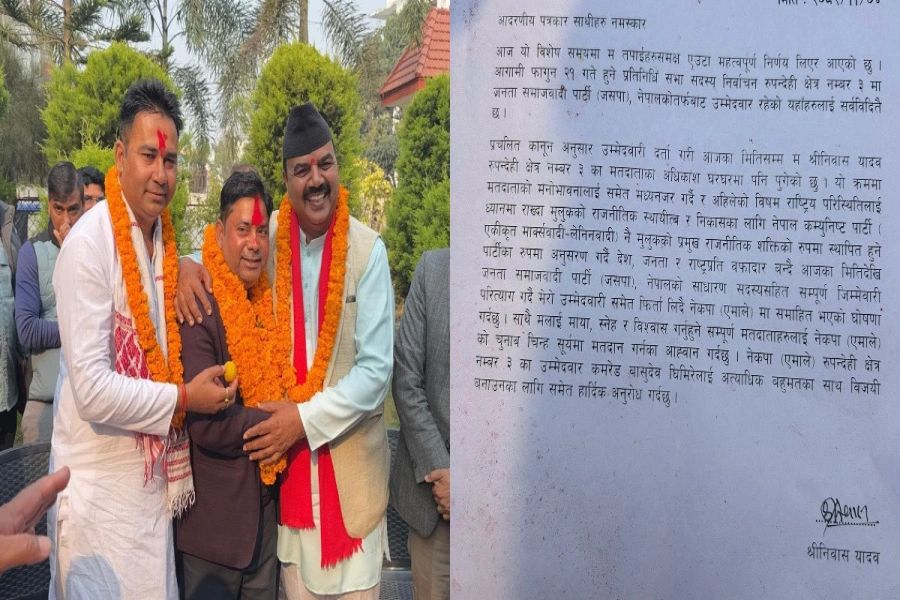KATHMANDU, Feb 14: The Supreme Court (SC) has ordered the release of a prisoner by reducing his six-year jail sentence, citing the precedent set in the case of politician Radhakrishna Mainali, who was arrested in 1973.
Pasang Tamang, alias Milan Lama, also known as Sandeep Pathak—the leader of the ‘Black Spider’ group that operated from Thailand and India to spread terror in Nepal—was granted the sentence commutation during the hearing of a habeas corpus petition.
The SC’s extended full bench ordered Lama’s release a year ago. Authorities held him in Nakkhu Prison after his arrest. In 2022, Lama filed a writ petition, claiming he had already served more than 12 years and deserved release. On November 9, 2023, the SC ordered his release. The full text of the verdict shows that the court considered the Radhakrishna Mainali case as a precedent. In 1983, the SC ruled in favor of Mainali’s release while hearing a habeas corpus petition.
The full text of the verdict states, "The court issued a habeas corpus order for a sentence served from November 13, 1973, to November 12, 1983." It further explains that the Jhapa District Court, while hearing a habeas corpus petition against Radhakrishna Mainali, ruled that his sentence for the murder-robbery case should not exceed the maximum limit.
The court determined that if the remaining term after the initial sentence was lower than the additional punishment prescribed, no further imprisonment was necessary. Since Mainali had already served 10 years, fulfilling the punishment under Section 41 of the National Penal Code, the court ruled that he did not need to serve an additional six years.
'Spider-Man: No Way Home' Gets Special Hardcover Making-Of Book

The SC’s extended full bench, comprising Justices Sapana Pradhan Malla, Binod Sharma, Manoj Kumar Sharma, Hari Prasad Phuyal, and Prakash Kumar Dhungana, considered multiple legal precedents before ordering Lama’s release. The justices ruled that since Lama had already served the sentence for the most serious charge, he did not need to serve an equivalent sentence for other similar charges decided later. Based on this reasoning, the court issued an order for his release a year ago.
Lama had been serving his prison sentence continuously since 2010. In 2019, the Kathmandu District Court handed him an additional 11-year sentence for drug trafficking. This ruling required him to remain in prison until 2029. However, he challenged the verdict by filing a habeas corpus petition in the SC.
Lama led the "Black Spider" group, which threatened various business families and entrepreneurs in the capital around 2006, demanding large sums of money and threatening to kill them if they refused. The police arrested him for allegedly hiring contract killers while he was living in India.
The full text of the order states, "In various cases, including the drug trafficking case filed in the Kathmandu District Court in 2017 (CR 1877), the court issued a judgment on September 24, 2019, and the Appellate Court, Patan, made the final decision on July 30, 2021, reversing part of the earlier judgment. Additionally, in the drug trafficking case decided by the Kanchanpur District Court on May 18, 2011, the Mahendranagar Appellate Court upheld the decisions.
The court sentenced the appellant to the highest prison term of 10 years, which was considered the maximum sentence for these cases. According to the legal interpretation above, the additional prison sentence should be calculated. Since the appellant, Pasang Tamang, also known as Sandeep Pathak or Milan Lama, has been continuously serving his prison sentence since December 10, 2010, the previous cases are deemed served.
Even though the court initially sentenced him to 11 years in the final ruling on September 24, 2019, the decision was reversed on July 30, 2021, and a 10-year sentence was imposed. As the prison order issued by the Kathmandu District Court's administrative division on December 21, 2021, did not specify the maximum sentence limit, the revised prison warrant was deemed illegal and annulled by the transfer order."
The order states that the appellant has been in prison since December 9, 2010. By December 8, 2020, the appellant had already served the 10-year sentence. As of December 9, 2020, the appellant continued serving time for the penalty in the aforementioned case. The fine for this case amounts to Rs. 204,000 (two hundred four thousand rupees).
The law mandates a deduction of 300 (three hundred rupees) per day for the period the appellant served beyond the sentence. Once this adjustment is made, and the remaining fine is paid, the appellant will not be held in prison for any additional charges or reasons. Based on these conditions, the court issued a habeas corpus order to release the appellant. As a result, the appellant was released with a reduced sentence, as no further prison time was required for the additional 11 years in the latest case.
According to the police, Lama formed his group in 2006 and used fugitive police and army personnel to shoot LP Sanwa Limbu, a member of the then Foreign Employment Entrepreneurs Association. Lama also orchestrated shooting attacks on Dr Hemanga Dixit, the then-principal of Kathmandu Medical College (KMC), and Dr Bir Man Shamsher Rana, the director.
After filing 20 charges against Lama, including threats, kidnapping, drug trafficking, and attempted murder, the Nepal Police Headquarters sought Interpol’s assistance to arrest him while he was hiding in Delhi. In December 2006, a police team, with support from Indian authorities, arrested Lama, effectively ending his group's reign of terror in Nepal. Investigators at the time claimed that his Black Spider group extorted money by threatening doctors, hospital operators, foreign employment entrepreneurs, and other business owners.
The police stated that Lama demanded Rs. 20 million from Dr Dixit and Rs. 40 million from LP Sanwa. When they refused to pay, he hired contract killers to shoot them. After the court found him guilty, he served a prison sentence. While residing in Thailand and India, Lama orchestrated terror in Nepal. In November 2007, Bihar Police in Patna, India, arrested him with a pistol. Authorities imprisoned him in Tihar Jail for 27 months. After securing bail, he re-entered the world of crime. The police received complaints accusing him of extorting 14 businessmen, including Min Bahadur Gurung, the operator of Bhatbhateni Supermarket; Nirmal Gurung, a foreign employment entrepreneur; and Ramesh Sharma of Sharma & Sharma Company.
After arresting Kedar Shrestha, Manoj Tamang, and Bir Bahadur (Akash) Khatri KC in 2006, the police discovered Lama’s whereabouts in Delhi. Nepal Police then alerted Bihar Police, who arrested him. Following Lama’s capture, the situation became more secure, according to police officials at the time.





































